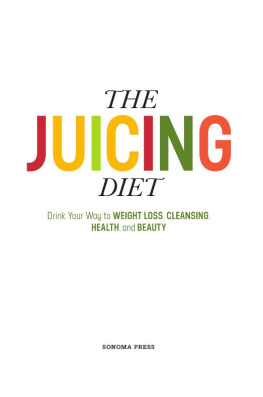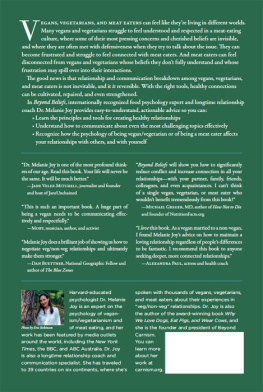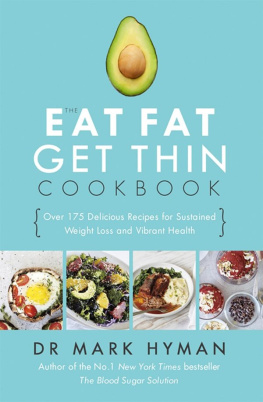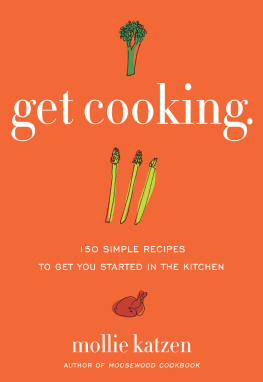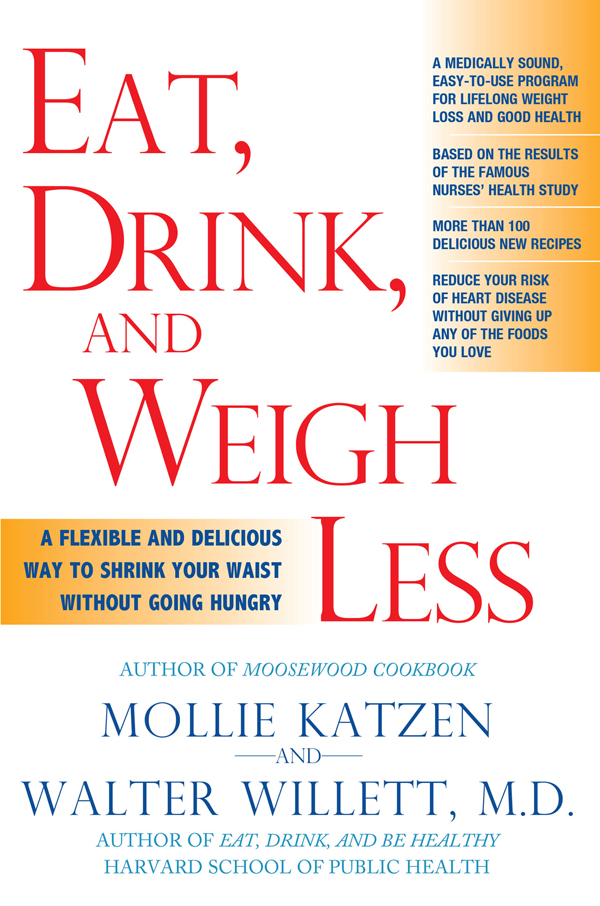

Copyright 2006 Tante Malka, Inc., and Walter Willett, M. D.
All rights reserved. Except as permitted under the U.S. Copyright Act of 1976, no part of this publication may be reproduced, distributed, or transmitted in any form or by any means, or stored in a database or retrieval system, without the prior written permission of the publisher. For information address Hyperion, 1500 Broadway, New York, New York 10036.
The Library of Congress has catalogued the original print edition of this book as follows:
Katzen, Mollie
Eat, drink, and weigh less : a flexible and delicious way to shrink your waist without going hungry / Mollie Katzen, Walter Willett.1st ed.
p. cm.
ISBN 1-4013-0249-1
1. Reducing diets. 2. Weight loss. I. Willett, Walter. II. Title.
RM222.2.K364 2006
641.5'635dc22
2005055119
eBook Edition ISBN: 978-1-4013-0601-4
First eBook Edition
Original paperback edition printed in the United States of America.
www.HyperionBooks.com
Theres no starvation on this diet written by one of the nations top nutrition researchers.
USA Today
The best book on nutrition for the general public.
Timothy Johnson, M.D., ABC News
What do you get when you put a world-leading nutrition researcher together with a beloved cookbook author? THE way for America to Eat, Drink, and Weigh Less! I recommend this remarkable collaboration with wild enthusiasm.
David S. Ludwig, M.D., Ph.D.;
Director, Obesity Program, Childrens Hospital Boston;
Associate Professor, Harvard Medical School
Dr. Walter Willett is a colleague, friend, and teacher. His contributions to the field of nutrition have long been an inspiration. In Eat, Drink, and Weight Less, Dr. Willett blends his exemplary knowledge of nutrition with the culinary talents of Mollie Katzen to provide a wonderful recipe for both weight control and better health. This is just what leaders in the nutrition field should be doing at a time of epidemic obesityblending science, creative thinking, and practicality to empower the public with new options. Once again, Dr. Willett is helping to set the standard.
David L. Katz, M.D., M.P.H., FACPM, FACP,
Associate Professor of Public Health;
Director, Prevention Research Center,
Yale University School of Medicine
Other books by Mollie Katzen
Moosewood Cookbook
The Enchanted Broccoli Forest
Still Life with Menu
Pretend Soup and Other Real Recipes: A Cookbook for Preschoolers and Up
Mollie Katzens Vegetable Heaven
Honest Pretzels and 63 Other Amazing Recipes for Cooks Ages 8 and Up
Mollie Katzens Sunlight Caf: Breakfast Served All Day
Salad People and More Real Recipes: A New Cookbook for Preschoolers and Up
Other books by Walter Willett, M. D.
Nutritional Epidemiology
Eat, Drink, and Be Healthy: The Harvard Medical School Guide to Healthy Eating
W e are hugely indebted to Steve Siegelman, whose master skills of prose, understanding, optimism, and passion were key to the birth of this book.
Many thanks, also, to Christine Swett, who assisted greatly and cheerfully with many tasks ranging from recipe tests to research and data organizationand sometimes on very short notice.
David Ludwig, M. D., and Meir Stampfer, M. D., Dr. P. H., were gracious enough to read the manuscript and share their expertise and tremendous knowledge.
We are grateful to our very supportive team at Hyperion, which included Mary Ellen ONeill, Will Schwalbe, Kelly Notaras, Bob Miller, Ellen Archer, Claire McKean, Ruth Curry, Anne Newgarden, Miriam Wenger, and Ruba Abu-Nimah, as well as the entire marketing and publicity departments. Wed also like to thank Cheryl Forberg, R. D., for her excellent nutritional analyses of the recipes.
Various friends, relatives, and colleagues were available to give feedback and personal testimony that greatly informed our approach to this project. We want to thank Jami Snyder, James DeZutter, Doug Wheeler, Felicia Kruger, Eve Shames, Tresa Smith, Stacey Kaufman, Jennie Kaplan, Duncan Cleary, Sarah Goodin, Robert MacKimmie, and Betty and Leon Katzen for their generous, interesting, and helpful comments.
Walter also thanks his wife, Gail, for support and good meals while working on this project and Debbie Flynn for making sure it moved forward along with other ongoing research activities.
T he recommendations in this book are not intended to replace or conflict with the advice given to you by your physician or other health professionals. All matters regarding your health require medical supervision. Consult your physician before adopting the suggestions in this book. Following these dietary suggestions may impact the effect of certain types of medication. Any changes in your dosage should be made only in cooperation with your prescribing physician. Before using any vitamins, be sure to consult with the appropriate medical authorities and check the products label for any warnings or cautions.
Pregnant women are advised that special precautions may pertain to diet. If you are pregnant, talk to your doctor before undertaking any dietary suggestions and before taking any nutritional supplements.
The authors and publisher disclaim any liability directly or indirectly from the use of the material in this book by any person.

How and Why We Came to Write This Book
Walter
F OOD, IN ONE way or another, has always been part of my upbringing, my life, and my work. Like many other pioneer families, the Willetts left New England generations ago to find a better life farming the fertile flatlands of the Midwest. My family cleared forests in Michigan to plant crops and graze dairy cows, and did so for nearly 150 years.
Producing food was a major part of my life while growing up. I belonged to 4-H clubs and the National Junior Vegetable Growers Association. At Michigan State University, I studied food science and learned about the use of technology to process, preserve, and distribute food.
Fascinated by the ways in which food affects human health, I decided to go to medical school at the University of Michigan, and then did my internship and residency in internal medicine at the Harvard Medical Service of Boston City Hospital. While this experience was rewarding in many ways, it was also frustrating, because I came to realize that the typical problems of our patients, such as heart disease, diabetes, and cancer, were seldom cured and often unsatisfactorily managed.
Wanting to better understand the root causes and potential prevention of these conditions, I pursued a doctoral degree in epidemiology at Harvard School of Public Health, which gave me a new way to understand the origins of human disease. Back in the late 1970s, nutrition was mainly studied in animals and test tubes, or in small, short-term studies in humans. To understand how dietary factors influence risk of cancer and other diseases, long-term epidemiologic studies in large populations were clearly needed. I decided to make that my lifes work.
Next page

